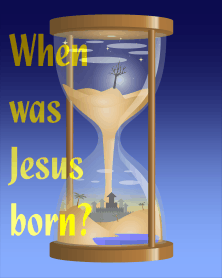The Day of Jesus’ Birth part 2 (Series: When Was Jesus Born?)
We’ve been talking about the actual day of Jesus’ birth – a very tricky question. In the last post, I pointed out that there probably were sheep and shepherds out in the fields all year round, so no specific help there. We also talked about what I think are some very serious problems with the theory that the Christians adopted a pagan holiday to use as their celebration of the Nativity.
 It seems likely that Christians were interested in the date of Christ’s birth from the earliest days. And as we know today, two dates in particular gained the most popularity – the 25th of December, and the 6th of January.
It seems likely that Christians were interested in the date of Christ’s birth from the earliest days. And as we know today, two dates in particular gained the most popularity – the 25th of December, and the 6th of January.
But why these particular dates, both in early winter? If it’s unlikely that the Christians were trying to copy a pagan holiday (in fact,the Christians may have adopted these dates long before they thought of “celebrating” them in any major way), then why choose these dates?
Things get a little bit complicated here, because of the various systems of dating used in the early centuries of Christianity. For example, we talked about Clement of Alexandria last time, who in 200 AD reported that there was a tradition that Jesus was born around the 5th or 6th of January.
Well, you’ll sometimes see that he gave a November date. It depends on whether he was using an old Egyptian solar year or not. If he used a newer dating system, it would be November. The older system is January. His dating of the crucifixion seems to use the older system, hence the preference for the January date. (And, incidentally, he places Jesus’ birth in 2BC.)
We know that January 6th is an ancient date. Another writer, even before 200 AD, seems to give the January date (Hippolytus in his commentary on Daniel 4:23).
In the west, Tertullian also seemed to be aware of an early winter date.
In spite of other suggestions, this may actually be the earliest date (late December/early January) that the early church held to. If this date was known in the west and the east less than 100 years after the death of John, probably even earlier, there must be some reason why.
In his book Calendar and Chronology, Jewish and Christian, Roger Beckwith points out the significance of this tradition. After questioning the connection of December 25th to a pagan festival, he points out that the problems with the 6th of January are even greater. It’s not really connected to winter solstice, or any major pagan festival. Such an early tradition pre-dates any evidence connecting the date Roman celebrations.
So again – if it’s not winter solstice or because of a pagan festival, why celebrate Christmas in early winter?
In the late fourth century, Christian preacher Chrysostom calculates a late December date using the date of Zechariah’s service in the temple. His calculations have several problems which we won’t get into here – but he does end up with a late December date for the birth of Christ.
Many early calculations have their problems. For example, the belief that Jesus was baptized when he was exactly 30 (and so His baptism was celebrated in early winter by some), in spite of the fact that Luke says He was “about 30″ (Luke 3:23). Or the belief that Jesus died the same day He was conceived – thus counting 9 months forward from a spring conception to a winter birth.
Today a lot of study has been done on the “courses of the priests” – that is, the time of year in which the priests would be in the temple, according to the group they belonged to.
We know that Zechariah belonged to the division of Abijah (Luke 1:5). So if we knew when the Abijah group was on duty, could we guess the date of John’s conception and birth, and therefore Jesus’ birth?
I’m afraid “guess” is an understatement. We get into so many variables, it’s really of no help at all.
However, is it possible some of the earliest believers had this information? Or even information passed down from Mary, and the early apostles? Would this explain why December/January was so widely followed so early?
As with the year of His birth, we simply don’t have enough information to be dogmatic. And we could go on and on with evidence and counter evidence.
But in the end, I don’t think we should be so quick to deny the December/January dates for the Nativity. After all, if the earliest believers used these dates, isn’t it possible that they knew something that we don’t?
